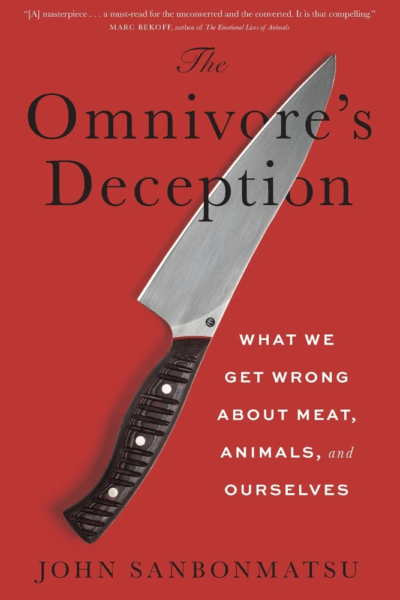
If the title of this book reminds you of the bestseller The Omnivore’s Dilemma by Michael Pollan, that is intentional.
For as author John Sanbonmatsu writes, Michael Pollan did a great disservice to animals when he said there was such as thing as good meat:
Pollan claimed to have found a narrow passage between the rock of the factory farm and the hard place of vegetarianism. The solution to our broken industrialized food system was to be sought in smaller-scale animal farming … [Pollan] positioned himself as the bearer of glad tidings for the millions of meat-loving consumers who, though concerned about the environment and vaguely uneasy over reports of animal cruelty, had no wish to overturn their dietary habits … We could have our meat and our consciences, too.
In other words, Pollan told anyone who may have been feeling uncomfortable about eating animals that they could still eat animals without guilt, provided they sought out local suppliers or “humane” alternatives. In doing so, Pollan created a new “deception” that the animal industry and its consumers have relied upon ever since.
For the vegan reader well versed in the animal rights movement, much of The Omnivore’s Deception: What We Get Wrong about Meat, Animals, and Ourselves may be familiar. You will encounter horrific statistics about the slaughter of pigs, cows and chickens. You will learn that the vegan movement stretches all the way back to the Greeks; vegetarians were once known as Pythagoreans (People have felt guilty about killing animals for thousands of years).
You will also learn that the word “meat” wasn’t originally exclusive to animals. Sanbonmatsu writes:
“Our ancient dependence on a wide variety of foodstuffs to satisfy the bulk of our nutritional needs explains why the word “meat” itself—from the Old English mete for “food”—for nearly a thousand years of common usages denoted any substantial foodstuff, not just the flesh of animals”
But the animal industries and their political enablers have done an effective job of making “meat” synonymous with animals. Plant-based alternatives are viewed so antagonistically that Missouri, in 2018, became the first state to make it illegal to sell plant-based food with meat-like words.
Why does an industry that sees its product on nearly every dinner plate act so defensively? Because the animal industry is built less on need than on illusion.
The truth is, as, Sanbonmatsu writes, humans do not need to eat animals to survive. So the animal industries continually tell us that one must eat animals for protein (false) that animals are happy to give their milk and eggs to humans (false) and that animals die “humane” deaths—the greatest falsehood of all.
But a lie cannot be effective if the consumer does not at some level crave it—perhaps the most important takeaway of this book. We not only consume meat but also the many lies surrounding it. It’s easier to not think about animals as individuals. It’s easier to not have to think about changing your meals, your holiday traditions, an entire worldview built on the belief that eating animals is necessary.
Sanbonmatsu says we are a society of self-deceivers, and he’s right. But fighting through these deceptions is no small feat. It takes courage to resist, to ask questions, to suggest plant-based alternatives, at work and at home. But if not now, when? How many billions of animals must suffer and die before we collectively awaken from our slumber? Judging by the political climate and mainstream media, one would think that carnviroism is here to stay. For instance, the high-end vegan restaurant Eleven Madison Park recently returned to serving meat.
Yet this book helps readers view this cultural backlash through a wider historical lens, offering up room for optimism.
As Sanbonatsu concludes, when we can finally treat animals—all animals—with respect and compassion, we won’t be stepping back into some idealized agrarian ideal. We will be stepping forward into a “more advanced civilization—a future society which, having chose to bury it whips, prods, and chains, to dismantle its slaughterhouses and to recall its trawlers, had won for itself the higher spiritual goods of compassion, mercy, and love.”
This book is more than an antidote to The Omnivore’s Dilemma, it is a bold step into the future.
John is co-author, with Midge Raymond, of the mystery Devils Island. He is also author of the novels The Tourist Trail and Where Oceans Hide Their Dead. Co-founder of Ashland Creek Press and editor of Writing for Animals (also now a writing program). More at JohnYunker.com.
